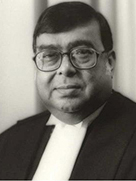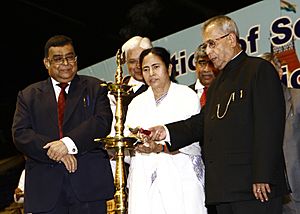Altamas Kabir facts for kids
Quick facts for kids
Altamas Kabir
|
|
|---|---|

Official portrait, September 2005.
|
|
| 39th Chief Justice of India | |
| In office 29 September 2012 – 18 July 2013 |
|
| Appointed by | Pranab Mukherjee |
| Preceded by | S. H. Kapadia |
| Succeeded by | P. Sathasivam |
| Judge of the Supreme Court of India | |
| In office 9 September 2005 – 18 July 2013 |
|
| Chief Justice of the Jharkhand High Court | |
| In office 1 March 2005 – 8 September 2005 |
|
| Preceded by | P. K. Balasubramanyan |
| Succeeded by | N. Dhinakar |
| Judge of the Calcutta High Court | |
| In office 6 August 1990 – 28 February 2004 |
|
| Personal details | |
| Born | 19 July 1948 Calcutta (now Kolkata), West Bengal, Dominion of India (present-day India) |
| Died | 19 February 2017 (aged 68) |
| Alma mater | University of Calcutta, Kolkata |
Altamas Kabir (born 19 July 1948 – died 19 February 2017) was an important Indian lawyer and judge. He became the 39th Chief Justice of India, which is the highest judge in the country.
Growing Up and Learning
Altamas Kabir was born in Kolkata (then called Calcutta) in 1948. His family was Bengali Muslim and came from a place called Faridpur, which is now in Bangladesh.
He went to school at Mount Hermon School in Darjeeling and Calcutta Boys' School. A teacher at Calcutta Boys' School was very impressed by an article he wrote. The article was about social problems and how to fix them. This teacher suggested he become a lawyer.
After school, he studied history at Presidency College. This college was part of the University of Calcutta. Later, he studied law at the same university in Kolkata.
His father, Jehangir Kabir, was a well-known politician and leader for workers' rights in West Bengal. He was a minister in the government. His uncle, Humayun Kabir, was also a famous Bengali writer and a minister in the Indian government.
His Work as a Judge

After finishing his law studies, Altamas Kabir became a lawyer in 1973. He worked in Kolkata, handling both civil and criminal cases.
He became a permanent judge of the Calcutta High Court on 6 August 1990. Later, on 11 January 2005, he became the acting Chief Justice of the Calcutta High Court. He helped make the courts in Kolkata more modern by bringing in computers.
He then became the acting Chief Justice of the Jharkhand High Court on 3 January 2005. This role became permanent on 1 March 2005.
On 9 September 2005, he was promoted to a judge in the Supreme Court of India. This is the highest court in India. Then, on 29 September 2012, he reached the top. He became the 39th Chief Justice of India.
He served as Chief Justice for about nine months. He retired on 18 July 2013. During his time as Chief Justice, he was also in charge of several important law universities in India. He even taught a course called "Law and the Child" at one of these universities.
He also became the head of the National Legal Services Authority (NALSA) in 2010. This group helps provide legal aid to people who cannot afford it. Under his leadership, NALSA made plans to help people across India. They also started a new project to offer legal help to transgender people.
Important Decisions
As a Supreme Court judge, Altamas Kabir made many important decisions. These often involved human rights and election rules.
In 2011, he was part of a ruling about the Protection of Women from Domestic Violence Act 2005. The court decided that female relatives of a husband could also be included in cases under this law. This helped protect more women.
On 8 May 2012, he and another judge ordered the government to stop the Haj subsidy by 2022. This subsidy was financial help for people going on the Haj pilgrimage.
On 19 October 2012, he granted bail to a journalist named Syed Mohammed Ahmed Kazmi. The journalist had been arrested for possibly being involved in a car blast. Kabir's decision showed that people have a right to bail if proper legal steps are not followed.
 | Precious Adams |
 | Lauren Anderson |
 | Janet Collins |

